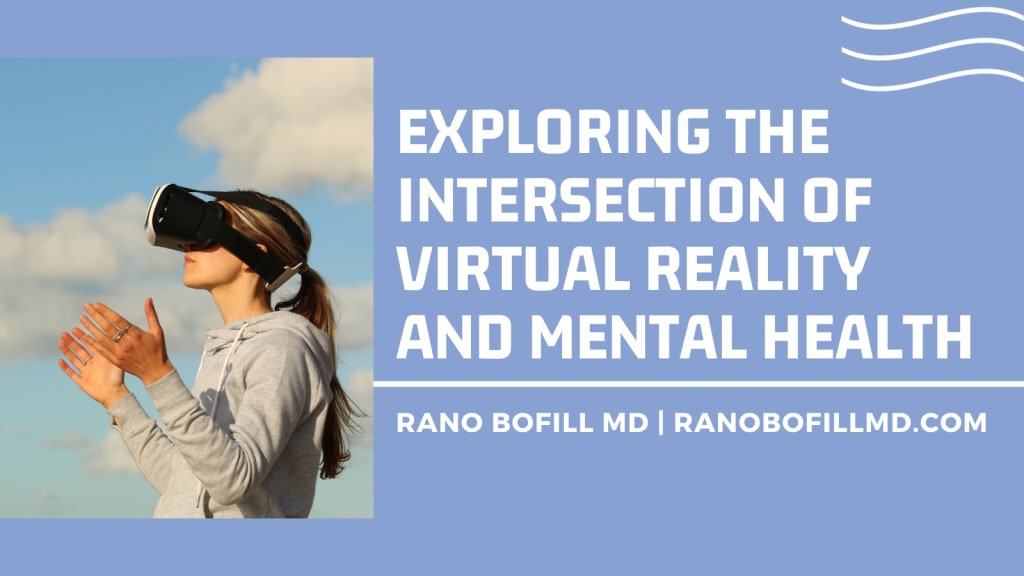Exploring the Intersection of Virtual Reality and Mental Health: A New Frontier in Therapeutic Innovations
by Rano Bofill

Virtual reality (VR) with mental health is a dynamic and pioneering new field for therapeutic strategies. This article examines how VR is transforming mental health care, furnishing alternative approaches for treatment and learning.
Understanding Virtual Reality
Definition and Evolution
Technology that uses virtual reality, which simulates the user's physical presence in a completely digital environment, has progressed remarkably over recent years. Its applications are still restricted to entertainment, but it is also used in education and training; recently, even mental health has been included.
Current Technologies in VR
Today's forms of VR wireless head trackers are quite advanced, and there are different levels, from simple smartphone-based headsets to systems that provide truly immersive experiences. These technological developments have cleared the way for VR to be applied in the treatment of mental illness.
Modern Age Mental Health Problems
Common Mental Health Disorders
Because we live in a fast-paced world, mental health problems such as anxiety, depression, and PTSD occur more often nowadays. The challenges of modern life have exacerbated mental health problems.
Impact of Technology on Mental Health
Technology itself, however, is quite commonly accused of spoiling mental health. On the other hand, the novel thing here with VR is that it offers treatment solutions for all psychological problems.
VR as a Therapeutic Tool
Historical Perspective
VR isn't a new therapy technology, after all. It has a history going back many years, growing with technological progress.
Current Uses in Therapy
In exposure therapy, cognitive-behavioral therapy, and relaxation techniques, VR is being used to provide patients with a playground in which to face their fears and practice coping skills.
VR in Mental Health
Anxiety Disorders
One application of VR has been to treat different kinds of anxiety disorders, where the patient can learn to confront his fears in a controlled and safe environment.
PTSD
While VR provides a safe way for people living with PTSD to re-live the traumatic memories, it gives them a chance to process and heal from those memories.
Depression
VR's immersive experience can relieve depression by providing a good stimulus and allowing patients to engage in helpful activities.
Benefits of VR in Mental Health
Immersive Experience
VR's completely immersive nature can be an effective tool in therapy. We can provide realistic scenarios and design them to suit the needs of each individual case.
Accessibility and Safety
VR therapy can be carried out from the convenience of one's own home, eliminating obstacles to treatment and safeguarding patient security.
Customization and Control
Therapists can tailor VR experiences to the needs of individual patients and provide controlled exposure and step-by-step treatment.
Challenges and Limitations
Technical Challenges
Development in the VR realm needs to proceed smoothly. Hardware limits and problems of continuing innovation make development easier.
Ethical Considerations
Like any other new technology, there are also ethical issues to be considered concerning privacy and consent, as well as the long-term effects of VR use in therapy.
Future Prospects
Potential Developments in VR Technology
The future for VR in mental health is bright, with further research and development continuing to increase its effectiveness and accessibility.
Expanding Scope of VR in Therapy
Given the rapid development of VR technology, we can look forward to seeing its applications in mental health expand even more.
We have seen how VR is subverting traditional concepts of mental health treatment, what it has to offer, and what problems might arise in the process. The future lies ahead. As technology marches on, so will the means of dealing with and improving mental health. In this ever-changing world, VR is only going to become more important.
About Rano Bofill
Rano Bofill, M.D., is a dedicated medical practitioner with over fifty-five years of experience, having chosen to spend a lifetime in the shadows serving his people in West Virginia. He loves people, and his sense of service runs deep. It was at the University of San Augustin that he started his medical journey. He entered the field of medicine in 1962, preceded by pre-medical studies between 1959 and 1961. In 1966, he received an M.D. from the University of Santo Tomas. In the Philippines, he interned, and then there was the U.S., where he started his externship in Ohio. His first works were E.R. and House Physician at Mercy Hospital in Columbus, Ohio, and hospitals in Alabama, Kentucky, and West Virginia. Eventually, he went into private practice, with emergency room work in West Virginia.
Dr. Rano Bofill studied Radiology in Philadelphia and was a chief resident at Germantown Hospital & Medical Center. An experienced radiologist, he worked at a number of West Virginia hospitals, including as a top radiologist at Man Appalachian Regional Hospital and residencies at Williamson Memorial and Roane General Hospitals. Dr. Bofill has now put down roots in West Virginia. He's pleased there that he can share his musical gifts and contribute to his new community. For more on his journey, visit his blog page.
About the Creator
Rano Bofill, MD
Rano Bofill M.D. is a compassionate healthcare professional, Radiologist, public servant, and musician who has dedicated his life and his career to the service of others!






Comments
There are no comments for this story
Be the first to respond and start the conversation.